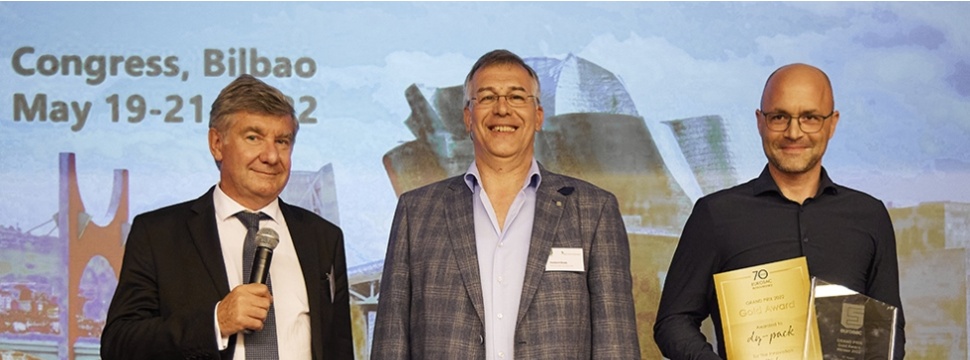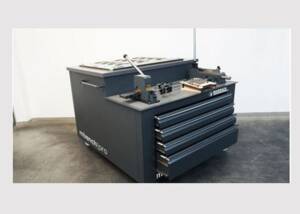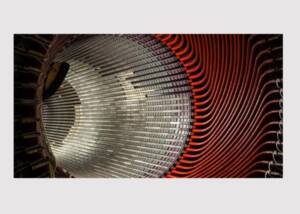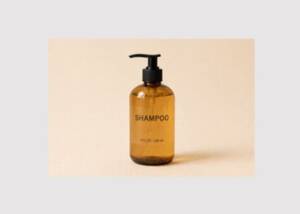Paper sacks on the move: EUROSAC Congress 2022
News General news
After two years of social distancing, the members of EUROSAC got together for a physical congress on 20 May in Bilbao. Under the theme “Paper sacks on the move!”, around 130 participants discussed recent developments for the fast-developing paper sack and sack kraft paper industry.

In the focus of discourse were challenges and opportunities of paper sack recycling in Europe. As one highlight of the congress, the industry’s most remarkable innovations from the past year were presented during the annual EUROSAC Grand Prix Award. The Gold Award went to dy-pack for Tidy, and the Silver Award was handed to Nordic Paper. Crown Van Gelder, Fiorini Packaging and Novidon received Bronze and Public Choice.
“Our industry is facing many challenges in this rapidly changing world, such as insecurities in the supply chain and rocketing energy and raw material prices. But as we have demonstrated in the past, we are perfectly able to navigate through difficult times by always being on the move,” EUROSAC president Olivier Tassel said in his opening speech. “I am sure that the congress will give us many new ideas and inspirations with directions to take towards a sustainable future.” The numbers from 2021 reflect the industry’s efforts to growing sustainably: the European paper sack industry delivered 4.8% more paper sacks than in 2020. The sectors with the biggest market share – cement (+3.4%), building materials (+8.2%) and food products (+3%) – contributed to the overall growth. The highest gains were recorded in minerals (+13.6%) and chemical products (+9.3%). 2022 started out well with 3.9% more deliveries in the first three months of the year.
In line with the EU environmental objectives
How to move towards a sustainable packaging supply chain within the EU packaging policies? From environmental performance to waste reduction and packaging design for circularity – the participants exchanged their progress in line with the EU policies and received an update on the industry’s initiatives, research and communication activities that support them in meeting their targets for a sustainable future. Representatives of paper recycling facilities and paper mills for recycled paper presented the challenges and opportunities of paper sack recycling in different European countries. Adding to that, they introduced models for collecting paper waste and shared best practice examples as well as issues arising due to new legislations. The subsequent round table allowed for specific questions from the audience and provided interesting insights about the valuable contribution of paper sacks to the circular economy.
EUROSAC Grand Prix Award 2022
During the Congress, the industry also honoured the innovations that added the most value to their customers with the EUROSAC Grand Prix Award. “The decision wasn’t easy. All five solutions show the expertise of our industry to constantly meet customer’s and society’s changing needs with our products,” said jury president Herbert Rode. The innovation with the most potential for the whole industry saw the jury with Tidy by dy-pack. “It receives the Gold Award because it fulfils many requirements of modern packaging at the same time, and can be used for valve sacks in a wide range of customer segments.”
More information about the award winners and entries follows:
The Gold Award went to Tidy from dy-pack. It is a new construction to create leakage-free paper bags using a novel glue application technique. The glue is applied in a uniform manner which closes the loopholes and micro channels in the sack that were formerly nearly impossible to close. Leakages are thus minimized to almost zero, which further reduces dust during filling. This leads not only to better health conditions and more hygiene in the working environments, but also prolongs shelf life and enables reduced plastic barriers as well as a cleaner product presentation.
The kraft paper waste bag won the Silver Award, and is in development by Nordic Paper in collaboration with the converter Jonsac, the municipality of Karlstad and Paper Province. It aims to offer an environmentally friendly, paper-based alternative to plastic bags for non-recyclable household waste. The waste bag is sealable and made of strong kraft paper, so that it is cleaner to dispose of and easier to handle by the garbage collectors. It is also recyclable and biodegradable. The bag has recently been tested in selected households. As the trials went very well, its development will be continued.
The eco-friendly paper sack based on sugar beet fibre by Crown Van Gelder, Fiorini Packaging and Novidon received the Bronze Award as well as the Public Choice Award. The sack consists of three layers of Crown Native paper from Crown Van Gelder: 20% of the virgin wood fibre of this paper is replaced by local Dutch residual sugar beet fibre, which reduces the environmental footprint by 16%. The potato-starch-based paper sack glue is made by Novidon. With those components, Fiorini Packaging produces an open mouth sack, which is not only food safe, but also recyclable, compostable and perfectly printable.
Other entries to the Grand Prix Award were the EkoMix dispersible bag for building materials by Klabin. It is a brown kraft paper sack that can be fully incorporated into the concrete preparation process. This reduces waste disposal at the construction site and costs for logistics and reprocessing. The sack is made from renewable materials and offers an ecological and sustainable packaging option for cement and concrete sacks.
Gascogne presented their new GascoGreen Natur’All. Instead of an HDPE film, the sack has a coating for moisture protection. Less than 2% of the material for the final sack comes from fossil origin, thus resulting in a plastic-free, environmentally friendly packaging solution. The sack is suitable for contact with food and can be easily recycled, thanks to the absence of the free film.










